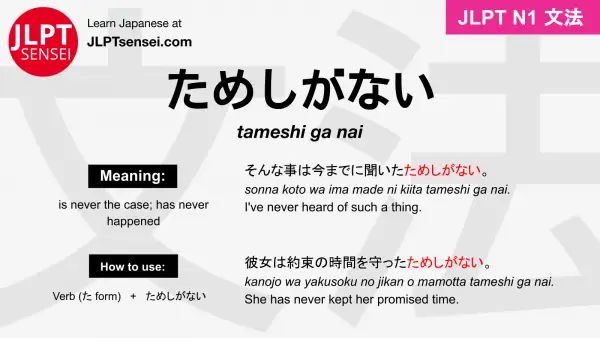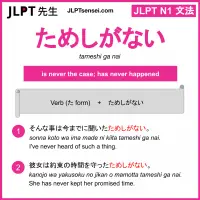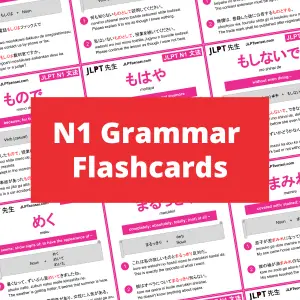Learn Japanese grammar: ためしがない (tameshi ga nai). Meaning: is never the case; has never happened; I have never seen or heard of ~.
Expresses the speaker’s dissatisfaction or surprise.
Usually uses hiragana form, but other forms include: 「試しがない」、「試しが無い」.
Access ALL extra downloads, ebooks, and study guides by supporting JLPT Sensei on Patreon.
ためしがない - Example Sentences 例文
Each example sentence includes a Japanese hint, the romaji reading, and the English translation.
Click the below red button to toggle off and and on all of the hints, and you can click on the buttons individually to show only the ones you want to see.
Example #1
そんな事は今までに聞いたためしがない。
Example #2
彼女は約束の時間を守ったためしがない。
Example #3
宝くじをたくさん買ってきたが、今まで当たったためしがない。
Example #4
彼はこの会社で10年間働いたけど、休暇を取ったためしがない。
Example #5
彼とはよく食事をするが、おごってくれたためしがない。
Example #6
毎月、寄付金を貰っているが、寄付の人に会ったためしがない。
Example #7
今までいくつものダイエットをしてきたが、成功したためしがない。
View all JLPT N1 Grammar Lessons
JLPT N1 Study Guide
N1 Grammar Flashcards
Full Batch Download
Download link includes:
- Print-ready PDF of square flashcards with cut-out guides (see preview)
- Full set of high quality .png image flashcards
- JLPT N1 Grammar 文法 square size (253 images)
- JLPT N1 Grammar 文法 rectangle size (253 images)



